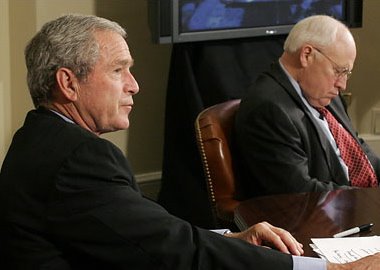That's the title of an EXCELLENT documentary that aired just the other day on the Link TV network.
http://www.wmdthefilm.com/ film's site
http://www.linktv.org/ network's site
It was about all the Hollywood tricks used to dazzle the reporters from the "run-up to the war" until now. For example, embedding the reporters with the troops, which was genius. Put them in danger and ask them to report on the people that are keeping them alive--Stockhom Syndrome, anyone? And pumping them full of fear of chemical weapons and putting them through all kinds of quick-put-your-mask-on drills, which kept them too busy to ask any real questions about the war. It won Best Doc at the 2004 Austin Film Festival, the Durban International Festival, and the Starz Denver International Film Festival.
"Most of the anti-war movement focused on the crimes of the Bush Administration ignoring the mainstream media, its far more effective accomplice," says former network producer Danny Schechter (ABC, CNN). "The government orchestrated the war while the media marketed it. You couldn't have one without the other." [from the film's site]
Schechter has just written a new book as a follow-up to the film, called "When News Lies", which is a follow-up to his 2003 "Embedded: Weapons of Mass Deception" which is "an account of the TV coverage of the US invasion". "'When News Lies' includes the feature-length DVD of the prize-winning film WMD (Weapons of Mass Deception)" so there's a way to get your hands on the documentary. You can also order it on the web site.
I had long suspected that the answer to, "Why weren't you asking the tough questions?" was, "We were busy making pretty graphics." Knowing what the news is going to be is gold in that industry. They had something like 7 months to make graphics, coordinate sat phones and set up shop in Iraq, and create all the computer graphics of planes, bombs, etc. When you ask what they were doing, they were getting ready for the mother of all telecasts, not questioning whether this was good for the country and holding people accountable. If they had been working on that, and we went to war anyway, they would have missed their chance to make the coverage as pretty and dazzling as the next network. CNN in particular had its own shadow to contend with-- the first Iraq war put them on the map, with rudimentary technology, and this time they felt they had to outdo themselves or risk looking like yesterday's news network. Now their ads boast they've won awards for their coverage.
The TV networks in America considered their non-stop coverage their finest hour, pointing to the use of embedded journalists and new technologies that permitted viewers to see a war up close for the first time. But different countries saw different wars. Why? [also from the film's site]
The film discusses "five wars": one that was actually being fought, the one we saw on US news networks, the one the Arab nations saw, the one Europe saw, and the one Iraqis were seeing. In South Africa, for example, the media focused on the US cluster bombs, how they worked, and their effect of blowing limbs off of children. Our networks showed the POV of the plane gleaming in the desert sun, while theirs showed the POV of the ground where the bombs were falling.
Another section talks about the public being misled, as is shown in this graphic. I wish the Daily Show was listed in this poll. Note that PBS (and they said this included NPR also) viewers (/listeners) were the least deceived. No wonder the administration is trying to kill public broadcasting.

I urge everyone to see the documentary and get the book. You will be shocked and disgusted, or you won't be because now this is what you expect from these government hijackers but now you'll have talking points.






No comments:
Post a Comment